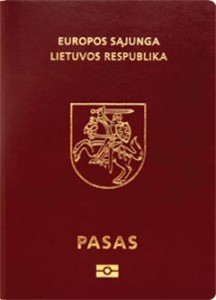
Lithuania insists that names on the primary page of a passport and national identification card be spelled in the Lithuanian alphabet, regardless of how the bearer typically spells his or her name.
VILNIUS — A Constitutional Court ruling saying Polish minorities may spell their name using their alphabet only on secondary pages in their Lithuanian passports has raised the ire of Polish politicians.
The Polish minority living close to the border between the two countries wants to write their names in the Polish spelling, using the diacritical characters of the Polish alphabet.
The court granted that they could do that, but not on the national identification card nor the primary page of their passports. The ID card is the primary form of identification in the Schengen zone, passports are optional. The decision puts to rest a decade-long court case on the issue.
Administrative mess
Minister of the Interior Raimundas Palaitis said entering non-Lithuanian names into government records would would make databases hard to access and could cost up to 20 million litai (€5.79 million) in administration work.
“This will be additional expenses, as the possibility to print in other alphabets will have to appear. We are talking about Polish characters now, but after we make this step, Chinese, other nationals might require the same,” Palaitis told journalists Friday.
Deputy Chairperson of the Lithuanian Language Commission Jūratė Palionytė told Baltic Reports it would be up to the members of Lithuanian parliament to decide now whether to adopt the ruling.
“The Seimas has to decide how it will be written because these people are citizens of Lithuania — we think the politicians have to decide,” she said adding that Latvia has seen problems by allowing ethnic minorities to write their names in their own script.
The court’s decision obliges the government to enter records into databases used by all state institutions.
The Seimas will have to pass special regulations on the passport entries in other languages. The court’s explanation hinges on the fact that the Lithuanian language is based on Latin characters.
Double standard
The Polish government told Baltic Reports that they are unhappy that ethnic Poles with Lithuanian nationality aren’t entitled to the same rights as ethnic Lithuanians with Polish nationality.
“All the provisions provided for by the act are observed by the Polish side, and these happen to be the very rights that are denied by the Lithuanians. The Lithuanians [in Poland] can, in territories adjacent to their border, use — as official — their native language,” Piotr Paszkowski, representative of the Polish Ministry of Foreign Affairs said referring to the Act on National and Ethnic Minorities.
Article seven of the document allows people to use their own language in Poland.
“People belonging to a minority shall have the right to use and spell their first and last names according to the spelling rules of their respective minority language, in particular in the official register and identity documents,” the act says.
The Lithuanian justice minister admitted that the court’s decision may violate bilateral relations with Poland.
Polish politicians have not held back in lambasting the court decision. Member of European Parliament Janusz Wojciechowski wrote on his blog that Poland should attack Lithuania politically because of what he sees as discrimination toward Poles.
“Lithuania is a European Union member, a European Council’s national minorities convention’s signatory and has a bilateral agreement with Poland, which was signed in 1994. These documents clearly state that national minorities have the right to write their names and surnames in their mother tongue,” Wojchechowski wrote.
The issue is one of many with the Polish minority in Lithuania. The Polish community also wants to rename streets in various towns as they were called previously under Polish rule. That issue remains unresolved.
The two countries were united from 1569 to 1795 under the Polish-Lithuanian Commonwealth and the current borders between the countries were only set in 1945. From 1919-20 the two countries fought a war over control of the Lithuanian capital Vilnius, which the Polish call Wilno.













To the best of my knowledge, The Lithuanians living in Poland have to bear polonized name. So there can be no talk about having equality. Not only don’t they have a right to have their surnames in Lithuanian, but have them polonized.
On the official website of the Lithuanian of Punsk region one girl has 2 surnames: in the Polish version she is Soroka and in the Lithuanian version she is Šarkaitė.